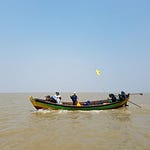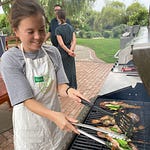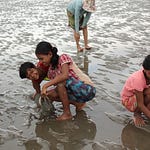"If you're going to work in small-scale fisheries, you'd better eat fish!"
^ What do you think?
Hint: I don't (entirely) agree.
I've heard this several times at various workshops and panels. Now, I do admit to a natural intolerance for generalizations stated as strong absolutes, especially if they're in the form of dictates. But the other reason this irks me is: I am a vegetarian. Have been for 18 years. And yet, I have managed to spend a lot of time in fishing villages, across several countries, and survived.
(Note: If you are a pescatarian who goes around telling people, "Oh, I'm a vegetarian, but I eat seafood," you really need to stop - and that's an absolute dictate I'm comfortable with)
The people who claim that not wanting to eat dead animals is mutually exclusive with working with fishing communities seem to not understand that (a) vegetarianism is not always just some sort of high-minded preference that can be easily discarded when inconvenient, and (b) people in fishing villages are not simple-minded folks who are incapable of seeing the humanity of those with inconvenient dietary values.
Now, I will start off with a major caveat before digging deeper into (a) and (b), and that is: if vegetarianism, veganism, or other dietary restriction is non-negotiable to you, you're going to have to acknowledge that some field sites and contexts are just not going to work for you. Working with indigenous communities in the Arctic, for example, is just not going to be a situation where you'll be able to meet your nutritional needs while holding to your deeply held vegetarian values. And it's entirely possible that this dietary restriction will inconvenience people, on some level, no matter where you go (in fact, that is the single thing that I dislike about being vegetarian). Since we are guests when we work with communities, it is up to us to ensure that we do as much as possible to ensure that our dietary needs are met while minimizing any related inconvenience to the communities and, if we're foreigners, to our local collaborators.
Getting along without killing animals is much easier in certain contexts than others, especially if you do eat eggs (so, tougher for you vegans out there), and especially if you work in an area where tofu, tempeh, seitan, beans/lentils, and fresh vegetables are readily accessible, and where vegetable dishes are common.
So, back to (a). For many people, vegetarianism is more than a resolution to live in a more environmentally- and/or animal-friendly way when convenient. It's not always a mere preference that can be set aside with ease. In my case, vegetarianism is rooted in my deeply held values about minimizing the harm I cause to others on this planet. I'm not religious, but my vegetarianism feels as important as any religious doctrine to me. Eating dead animals, to me, is heavier than the regret I feel at the inconvenience it might cause others (
The idea of eating meat, after this many years, is frankly disgusting to me, and I've always had a hard time swallowing most seafood (seriously, ask my mom - something about most seafood makes me gag) (very un-Japanese of me, I know). I initially tried to be more flexible in my early days of vegetarianism; my first fieldwork after that was in Peru (where, incidentally, the Hare Krishna have vegetarian restaurants in several major cities, for which I felt more gratitude than I'd ever expected to feel for the Hare Krishna), and I valiantly tried to eat ceviche or chicken to reduce any inconvenience to my field collaborators. But I just couldn't do it. Making the official switch to vegetarianism had flipped my mind and body into a new state, where eating in a way that was incongruent with my values became physically unpleasant.
Many people are vegetarian for cultural or religious reasons or, like me, deeply held values. Some might also just have a natural and strong aversion to meat or seafood (and such intolerances can also be linked to neurodivergence). So flippantly saying "well, then you can't work in fishing villages" is just... insensitive.
As for (b): truth be told, being a vegetarian is not going to make it easier for you to bond with people in *fishing* villages. I know this. However, there are many other ways to connect with people. It's not like fishers are blockheads who think, "No eat fish? No be friends!" I definitely get puzzled looks when I or my team explain my diet. But people have understood. I make a real effort to learn enough of the language so I can chat, be polite, and joke around, even if I'm far from the fluency needed to conduct interviews. I make sure to orient myself to social norms so that I am respectful in how I act and what I wear. My teams and I prepare appropriate tokens of appreciation to share with the people who help us.
As I often say: I don't eat seafood, I don't drink alcohol, and I don't smoke, and yet somehow, I've been able to work in fishing communities just fine.
Actually, some of the best vegetarian food I've had has been in the field. In Thailand, our boat captain's mother-in-law was a Buddhist vegetarian, so his wife was able to prepare fantastic vegetarian lunches for me (including seaweed-wrapped soy "fish"). And in Indonesia, I *gained* weight because tempeh was readily available, and my team quickly learned that I loved fried tempeh in sambal (chili sauce) - they would bring out platefuls of freshly fried tempeh while I said on a dock and took photos of passing dolphins. At the end of the field season, one of my assistants nodded approvingly and said, "You got fat! It looks good" (thumbs up).

However... I admittedly spent several months under-nourished in the Philippines, as I worked in a remote area that did not have great access to fresh vegetables, and where vegetable dishes are almost aggressively punctuated by morsels of meat or seafood. I also was working way too hard, and not taking care of myself in general. The Philippines is the most difficult place I've been to, in Southeast Asia, for vegetarians once you get away from the big cities. It's notoriously sparse on the fresh veggies, particularly if you don't want meat or seafood sprinkled among those veggies. But! once my team really figured out what "vegetarian" meant, and once we moved to a field house with its own kitchen, things turned around. One of my field assistants insisted on cooking for us, and she came up with some great improvised veg dishes to make the most of the limited offerings at the market.
So, what can we vegetarians do to avoid being under-nourished and inconvenient? Some ideas:
(1) Be pragmatic about your choice of field site. Be aware that some environments just aren't suited for growing fresh produce, and that access to fresh vegetables, non-animal protein, and even eggs might be limited or nonexistent in some places. In some cultures, it might be downright offensive to turn down a specific meat or seafood item of food that is offered to you. Cultures that have more veg-friendly cuisines, and/or proximity to well-known groups who follow vegetarian diets as part of their beliefs and practices (e.g., Buddhist monks in many parts of Asia), are going to, obviously, be easier. Don't try to force your vegetarianism in a situation where it's just not going to be logistically and/or socially feasible.
(2) Learn how to explain what vegetarianism means. Some languages have a word that means "vegan" (e.g., tetalu in Burmese or jay in Thai). Others, well, you'll need to rattle off the groups of animals that you don't eat (walang hayop, walang isda, etc. in Tagalog). "I don't eat meat or seafood, but egg is okay" is one of the first phrases I'll learn (and where I work, dairy is pretty rare, so it's irrelevant)2. And learn how to *politely* decline meat or seafood.
(3) Learn what veg-friendly options will be accessible at your site. So: what's going to be sold, as ingredients or prepared foods, at the local markets? If there are restaurants nearby, what veg options do they have? Are there common dishes that can easily be made vegetarian? If someone will be cooking for you, will they be able to adjust based on your needs? Will you have access to your own kitchen, where you can concoct your own veg delights?
(4) Calibrate what you can compromise on. Now, that might be nothing, and that's fine - just be aware of the implications. For me, I have chosen to not be particularly strict about chicken stock (pork and beef stock do hurt my stomach at this point, and very fishy broth is really hard for me to swallow) and tiny *hints* of fish sauce. I am not, however, able to deal with picking meat morsels out of dishes - there is just too much animal-y oil that makes its way onto the vegetables. Maybe you feel like you can, actually, eat fish (and in that case, you are a what? A pescatarian, even if only temporarily in the field, until you return to true vegetarianism after your fieldwork).
(5) Prepare what you can. When I know I'll have access to a kitchen and/or a person cooking for me who can adapt based on my needs, I'll bring along soy curls or textured vegetable protein. Since they're dried, they are lightweight and have a long shelf life3. Dried seaweed is another great option for getting some nutrients. Supplements can help, too - I've brought protein powder and green powder when I feel like more fresh, whole options won't be available.
(6) You might need to inconvenience people, slightly, for this one: if you're working with a team, explain your dietary needs to everyone. I've found that my local team often mediated offers for meals, etc., and it was better for everyone when they felt comfortable explaining to our generous hosts what my deal was.
(7) Accept that there might be circumstances where you'll have to choose between being well-nourished and being vegetarian. I once chose to eat freshly-grilled fish (which, thankfully, tasted minimally fishy) in Madagascar because we'd run out of the veg and eggs we had brought to a remote village.
(8) Hint learned the hard way: If you're not sure whether a dish is vegetarian, ask first. And, if you're still in doubt, sample only a *little* of it. I once shoveled a plateful of greens that a fisher's wife had kindly prepared for us, only to quickly realize that it was full of shellfish morsels and tasted *extremely* seafood-y, and I literally had to squirrel away spoonfuls into an extra plastic bag I had, hidden under a bandana on my lap, when she wasn't looking because I physically struggled to eat it without gagging.
I hate the idea of anyone being pressured to give up their genuine moral values, and I also hate the idea of communities and local collaborators (for us foreigners) being further inconvenienced. Believe me, if I could readily set aside my vegetarian ways for the convenience of collaborators and communities, I would. I've tried, and I just can't. And that's okay, because I've mainly worked in places where access to vegetarian food is actually pretty easy. And I ensure that my interactions with my team and with local communities are respectful, kind, and friendly; I always keep in mind that I am a guest, and that they are sharing with me their time and energy.
So, in short: if you want to be a vegetarian in the field, do your homework first, choose your site wisely, come well-supplied, clearly explain your dietary needs, and don't be a jerk.
----
1Story: I found that saying that I was Buddhist really helped me on multiple fronts in the Philippines, and since my grandma was actually Buddhist and it's the religion I'm the most familiar with, it wasn't a huge lie (note: I do not endorse dishonesty, but hey, this was victimless, and I was desperate). I'd found that honestly answering the oft-asked question of "what religion are you?" with my vague, non-denominational spiritual beliefs had led some people to assume that my soul was up-for-grabs, and endured some attempts to sway me toward Christianity. And my vegetarianism had no context for many people there, since it couldn't be explained by my non-existent religion. And the Japanese half of my ancestry was very obvious to most people there. So, explaining that I was Buddhist made it all easier: "That makes sense, since you're obviously Japanese, and we know many Buddhists don't eat animals, and since you're already claimed by a major religion, we won't try to convert you."
2Incidentally, this was my impetus to learn how to read Thai - so I could read the menus at food stalls and know which items made sense to ask for as "jay" and which would be absurd to ask for without meat, e.g. "could I have the meatball soup without meat?"
3Story: I have two lovely Vietnamese friends (Vietnam is a vegetarian's paradise, by the way) whom I visited in Saigon shortly after they'd returned from their first field visit to the Philippines. They'd been horrified by the lack of fresh vegetables there. As I was on my way to fieldwork in the Philippines, they urgently pressed upon me bags of dried vegetarian protein and wakame (dehydrated Japanese seaweed, often seen in miso soup), and they were already planning to bring the same on their next trip to the Philippines.















Share this post